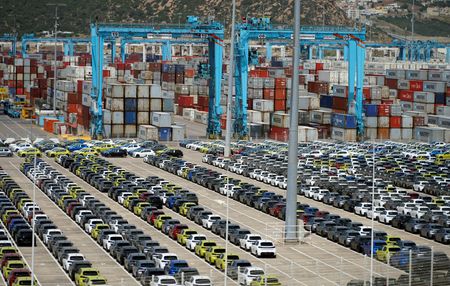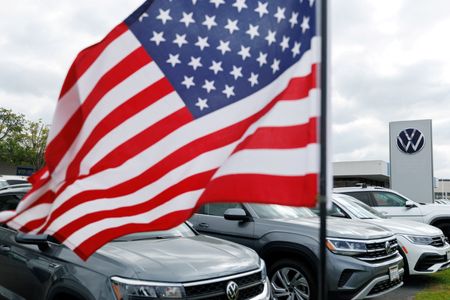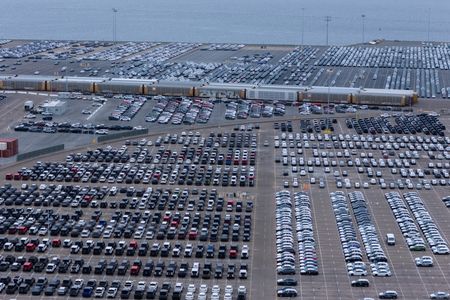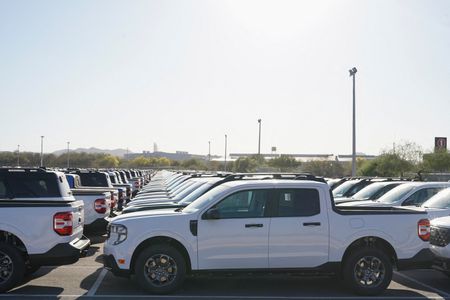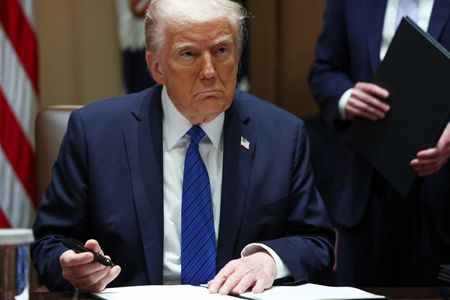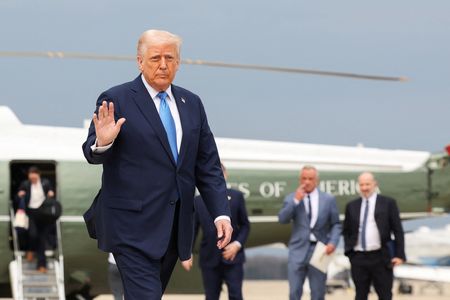By David Ljunggren and Victoria Waldersee
OTTAWA/BERLIN (Reuters) -Canadian Prime Minister Mark Carney said on Thursday that he would respond with unspecified trade actions if U.S. President Donald Trump imposes new auto tariffs that have expanded a global trade war and hammered stocks.
Carney said he had not yet determined what actions Canada might take if Trump follows through with his plan to impose new 25% levies on imported cars and light trucks. He said he would respond next week, when the auto tariffs and a separate set of reciprocal tariffs on U.S. trading partners are due to take effect.
“We will fight the U.S. tariffs with retaliatory trade actions of our own that will have maximum impact in the United States and minimum impacts here in Canada,” Carney said at a news conference.
European countries have threatened retaliation as well.
The tariffs could add thousands of dollars to the cost of an average vehicle in the United States, contradicting Trump’s campaign promise to lower consumer prices. Ferrari announced price hikes of up to 10% for cars sold in the U.S., and other automakers also warned they might raise prices as well. Dealers raised fears of job losses.
The S&P 500 ended lower on Thursday, with auto stocks falling. General Motors tumbled over 7% and Ford slid 3.9%. Car parts manufacturers Aptiv and BorgWarner each lost around 5%.
Tesla edged up 0.4%, with investors betting the electric vehicle maker will be hurt less by tariffs because of its largely domestic production.
The tariffs are a sucker punch for some of the United States’ most important allies and would come atop other trade penalties Trump has already put in place. Mexico, Japan, South Korea, Canada and Germany are the biggest suppliers of automotive imports to the United States that were worth $474 billion in 2024.
Carney said Canada would transform its economy to become less dependent on its southern neighbor, which has long been a close ally and important trading partner.
“We will need to reduce our reliance on the United States,” he said at the press conference.
That may prove difficult. Vehicles are the second-largest Canadian export by value (after oil) at $51 billion in 2023 – of which 93% was exported to the United States.
With billions of euros wiped from German auto shares on Thursday, officials in Europe’s biggest economy called for a tough response.
“The U.S. has chosen a path at whose end lie only losers, since tariffs and isolation hurt prosperity for everyone,” German Chancellor Olaf Scholz said.
In neighboring France, which is hosting a Ukraine summit without the U.S. on Thursday, Finance Minister Eric Lombard called Trump’s plan “very bad news,” and said the only solution was for the EU to raise its own tariffs.
Britain, which has struggled to expand its economy, was scrambling to secure an exemption but also threatened to review subsidies given to Tesla, which is headed by top Trump adviser Elon Musk. Canada froze rebate payments for the car maker on Tuesday.
The company, which faces declining sales, increased competition and a political backlash, is less exposed to Trump’s tariffs than its rivals, but Musk said on X that the impact is “still significant.”
JP Morgan said the tariffs would raise new car prices by $4,000 to $5,300.
“None of this leads to more jobs or better wages. It leads to sluggish sales, costlier credit, and potential layoffs – exactly what a fragile economy doesn’t need,” said Nigel Green, CEO of global financial advisory deVere Group.
TRUMP THREATENS FURTHER ESCALATION
Sources said the Trump administration also has paused contributions to the World Trade Organization, further hobbling the global trade watchdog as it yanks support for international institutions it sees at odds with its “America First” agenda.
China’s foreign ministry said the U.S. approach undermines the multilateral trade system and was “not conducive to solving its own problems.”
With shares falling, Japanese Prime Minister Shigeru Ishiba said Tokyo will put “all options on the table” and South Korea said it would put in place an emergency response by April.
Trump sees tariffs as a tool to raise revenue to offset his promised tax cuts and to revive a long-declining U.S. industrial base.
Many trade experts, however, expect prices to initially rise and demand to fall, hurting a global auto industry that is already reeling from uncertainty caused by Trump’s rapid-fire tariff threats and occasional reversals.
Trump said he might hit the EU and Canada with larger tariffs if they teamed up to retaliate.
“If the European Union works with Canada in order to do economic harm to the USA, large scale Tariffs, far larger than currently planned, will be placed on them both in order to protect the best friend that each of those two countries has ever had,” he said in a post on Truth Social.
(Reporting by Nandita Bose, Doina Chiacu, David Lawder, Andrea Shalal and David Shepardson in Washington, Leika Kihara, Tim Kelly and Junko Fujita in Tokyo, Giulia Segreti and Giulio Pivaccari in Rome; Victoria Waldersee in Berlin, Dominique Vidalon and Dominique Patton in Paris, Bart Meijer in Brussels, Kalea Hall in Detroit, David Ljunggren in Ottawa, Costas Pitas in Los Angeles, Lewis Jackson in Beijing, Catarina Demony in London and Lefteris Papadimas in Athens; Writing by James Oliphant, Andy Sullivan, Lincoln Feast and Matthias Williams; Editing by Nick Zieminski and Matthew Lewis)


